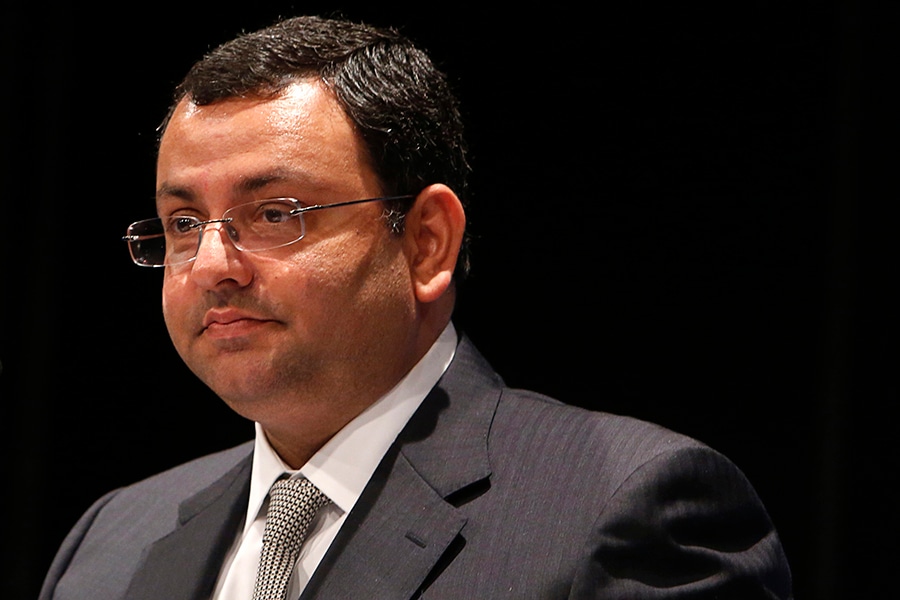Tata Group no one's personal fiefdom: Cyrus Mistry in letter to shareholders
Strongly-worded 14-page letter points to governance breakdown, need for reform of Tata Trusts



Cyrus Mistry
Image: REUTERS/Vivek Prakash
In a strongly-worded communication to shareholders of the Tata group ahead of the extraordinary general meetings (EGMs), ousted Tata Sons chairman Cyrus Pallonji Mistry has said that the $103-billion group was “no one’s personal fiefdom” and belongs to all stakeholders.
Tata Sons is seeking to remove Mistry from the boards of the operating companies by way of the EGMs.
The representation to shareholders, made under section 169 of the Companies Act of 2013 which deals with removal of a director from the board, dwells on several aspects of the bruising public battle currently playing out at the 148-year-old Tata group, and which came into the open on October 24 when Mistry was suddenly replaced as Tata Sons chairman and Ratan Tata, chairman of Tata Trusts, which control 66 percent of Tata Sons, brought back as interim chairman for a period of four months until a replacement was identified.
In the representation to shareholders, Mistry puts forward the reasons for the actions he took as chairman of the group, dwelt on the manner in which he was removed, the role of the nominee-directors of the Tata Trusts on the Tata Sons board and also referred to Ratan Tata a number of times.
“The Tata Group is no one's personal fiefdom: it does not belong to any individual, not to the trustees of Tata Trusts, not to the Tata Sons directors, and not to the directors of the operating companies. It belongs to all the stakeholders, including every one of you,” Mistry said in his letter.
The slew of EGMs at the group begins with that of Tata Consultancy Services (TCS), the group’s software giant and cash cow, where Tata Sons holds a hefty 73.3 percent. This will be followed by EGMs at other major Tata companies where Tata Sons has lower shareholdings and where the public financial institutions like Life Insurance Corporation are expected to play a crucial role.
Dwelling in detail on the structure and what he calls the “erosion of governance” at the group, Mistry went on to stress that at the core of the issue is the role of the Tata Trusts, a clutch of philanthropic trusts which control Tata Sons.
“Tata Sons, a core investment company, is the promoter of Tata Group companies including your Company. About 66% of the share capital of Tata Sons is held by Tata Trusts. The Tata Trusts are “public charitable trusts”. The beneficiaries of these public charitable trusts are the general public of India. These trusts are not family trusts as one normally thinks of trusts carrying a family name. The very future of the Tata Group lies in how the trustees govern the Tata Trusts, since the main trust property is the holding of shares in Tata Sons,” he said in the letter to shareholders.
“Therefore, the very vision of the Founders could be under threat unless governance of the Tata Trusts is reformed and subjected to a compliant and transparent process of checks and balances.”
Stressing on the aspect of governance, he said: “At the heart of the sustainability of the Tata Group is governance reform, throughout the institution.”
Mistry said the “Tata brand will remain valuable only so long as the conduct of the Tata Group is consistent with what the values that the brand stands for. Your Company pays a royalty to Tata Sons for use of the Tata brand. Inherent in this arrangement is a premise that the Tata Trusts would conduct themselves in a manner that enables Tata Sons to retain the sheen of the Tata brand by living the values, ethics and morals that the brand stands for.”
Referring to problem areas in the Tata group, which he had earlier referred to as “legacy hotspots”, he said his strategy “could not be only about repairing the “hot spots”.
“We simultaneously had to future-proof the Tata Group with outstanding performance – companies such as TCS, JLR, Titan, Voltas and others, which were leaders in their chosen markets. We started down the journey of unraveling group company cross-holdings, the first of which was Titan. We invested in growth platforms to move closer to the customer and sought to create non-cyclical businesses particularly in the consumer products sector and financial services. We also seeded next generation businesses in the digital and healthcare space such as Tata Cliq, Tata IQ and Tata Health. Our investment in growth over the last three years was in excess of $25 billion across the Tata Group, substantially met from internal cash generation,” he added.
First Published: Dec 05, 2016, 18:07
Subscribe Now